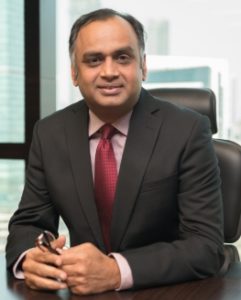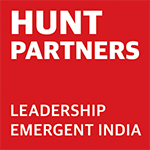Amitabh ChaturvediMD ‐ Essel Finance
Mr. Amitabh Chaturvedi, a Chartered Accountant by qualification, has more than 27 years of rich experience in the areas of Banking, Asset Management, and Insurance, etc. Currently, he is the Managing Director of Essel Finance, a multi-billion dollar Essel Group. He worked in large corporates like ICICI Bank, Reliance Capital and Dhanlaxmi Bank.
During his stint with ICICI Bank, he worked in Planning and Treasury, Retail Banking, and Distribution, where he got vast experience of managing large customers.
He also worked for Reliance Capital and created Lending, Insurance, Broking and Wealth Management. He is known for his tenure with Reliance Mutual Fund, where AUM grew from 1500crores to almost 90000crores in a little above four years.
One of his most challenging assignments was working for Kerala-based Dhanlaxmi Bank, where he converted a religious regional bank to a technology savvy new generation bank. During a short span of a little above 3years, the business size grew from 5800crores to approximately 23000crores.
His working style is a mix of entrepreneur and team work. He does delegate and trust his team but never takes his eye out of delegated work.
He is a great cricket fan and watching two movies a week is a must for him.
One of his great support is his wife, who is a yoga teacher. His son is a banker and daughter is a lawyer.

1. What was the mandate given to you by the Board when you took over in your role?
Five years ago the board offered me a mandate to diversify Essel Group business into financial services conglomerate.
2. How much of that has been achieved? What were the challenges faced?
With six operating business entities – Mutual Fund, Forex(money changing), Home Loans, NBFC, Wealth Services, and Private Equity operating under the Essel Finance umbrella, the group is already prepared to provide full range of financial services to the end users.
Among these, many of the verticals have already achieved break-even. Organisation structure, licences and other regulatory clearances and people are well in place, the healthy capital infusion is further strengthening our business model. Now, we are very much prepared for the second phase of expansion that includes organic as well as inorganic growth. The biggest challenge that we faced in our journey was to get a strong professional team to propel our winning strategies. We have on board some of the best minds from the sector and Essel Finance is now a well recognised brand name.
3. What are the key challenges your organization is facing currently? And what are the steps you are taking?
The biggest challenge faced by Essel Finance now is to embark on the second phase of its development trajectory, where profitability grows disproportionately larger to its size. I convince my team members to set standards outside their comfort zone to achieve aggressive goals.
4. How have the changes in technology/globalization/economy affected your sector?
In the last four five years, all these three vital factors have brought a significant transformation in the financial services business. Usage of technology has played a vital role that has enabled greater transparency in executing financial goals. It has also helped to cut down the time taken in processing and necessary approvals. Now, everything is possible online without need of any paper work. This creates greater competition, improves service quality and is ultimately good for the consumer. Companies that are good in anticipating market disruptions due to technological progress and making fast course corrections are the only ones that can retain customer loyalty.
Nevertheless, at the same time globalization has affected the financial sector at the most. For example, globalization has opened up investors’ access to economies across the world, leading to immense opportunities for investors to find better returns inside and outside of their home country. Hence, the prospects for financial services businesses have expanded across the world. Moreover, financial markets are incredibly news and information sensitive. Due to easy and fast access to news or a particular event, respective markets react immediately. This has both a good as well a bad part.
However, I believe that democratization of financial services globally has not yet reached a point where retail investors & SMEs can benefit fully. Currently, it’s only the HNIs and corporates who can take advantage of cheaper loans abroad and greater diversification. At the same time, there is a greater access to risk capital for start-ups from funds that raise funds internationally, allowing them to explore previously unexplored, high-risk, high-reward business opportunities.
Lastly and the most important factor, the Indian economy, it has opened up significantly under the present government, with FDI restrictions eased substantially. This provides opportunities to SMEs and Indian corporates to tie up with foreign players, bringing capital and business opportunities on the back of the consumption & infrastructure growth story. This has trickle-down effects for the financial services industry, with greater credit demand both for companies and individuals.
5. What is your talent strategy? How do you draw the balance between home grown vs lateral hiring at the leadership level?
My talent strategy philosophy is very closely interlinked and aligned with the business strategy and quality and fitment of talent is derived from the vision of the business. I believe in identifying high potential and high performing employees and getting them ready to take on future leadership positions. However, diversity also plays an important part in the talent strategy and lateral hiring is encouraged for positions, where internal talent isn’t available and it is a niche position. Except the position of the group CFO, we have opted for lateral hiring at Essel Finance.
6. How does your organization identify and develop future leaders?
I ensure that I interact with my colleagues, who render services in leadership positions, at least once a week through a mandatory leadership council established. I meet my professionals who occupy the second rung on a monthly basis and the employees at large at the town hall. I am a firm believer in regular formal as well as informal interactions as a pre-requisite to use the 9 block Hi-Po & Hi-Per for identifying talents so as to develop and nurture them into future leaders. Learning opportunities are offered through job rotations and job enlargement. Our future leaders are sent for structured training programs for MDPs at ISB and IIMs. Essel Group employees are provided with networking opportunities and are encouraged to actively participate as speakers in industry seminars related to their domain.
7. In a world full of volatility, Uncertainty, complexity & Ambiguity (VUCA), innovation has become one of the most important factor to transform a crisis into an opportunity. How do you promote Innovation?
We have a digital arm that focuses on innovation through the use of technology. For example, we have implemented online forex purchases on our website. There will be many more such innovations that will be implemented going forward, to eventually provide our customers with greater ease of transaction and better service quality.
8. How do you define & practice leadership?
Leadership for me is the comfort level that my team members get in their professional and personal interactions with me. I am always accessible for my colleagues, even outside the mandated working hours.
The concept of leadership to my understanding is not based on power and authority that a person who occupies such a role exudes, but on each one of my team members taking responsibility of his or her work, ethics and integrity. A good leader motivates and imbibes his or her colleagues with the traits needed to provide solutions to problems faced while discharging duties on a day-to-day basis and also, in the long run. A true leader instils confidence in the employees, which moulds them into future leaders.
9. How Indian leaders can become Global Leaders?
In today’s globalised economy, global leaders are not born by adopting business practices followed in other parts of the world. Business leaders dream and implement their dream of setting up companies that leave a mark in all corners of the globe. A case in point was the birth and growth of Essel Propack that became the first truly Indian MNC. Global leaders visualise and power global companies that touch the lives of human beings inhabiting even the far-off corners on this earth.
10. What are the 3 most pivotal moments in your career that you either learned from and/or that got you where you are today?
My stint with ICICI Bank became the first and most important example of career-shaping decision that I took even at the cost of accepting a salary cut. This decision was influenced by the opportunity to work under the mentorship of Mr KV Kamath. My time spent here ingrained in me the characteristics needed to take on leadership roles in my future assignments.
Secondly, I would also like to mention that my association with Dhanlaxmi Bank helped me view every situation from a 360 degree perspective and to better evaluate the risks at stake. And the third turning point in my career was defined by my decision to push back my retirement goal from the age of 50 years to 55 years. Dr. Subhash Chandra gave me the task to establish a large financial conglomerate under the Essel Group which I took it up as a challenge to create a large financial conglomerate from the scratch and also under a large well established group majorly in the entertainment domain.
11. What message would you like to share with young professionals at the start of their career?
The first job has the most important role in any one’s career as it lays the foundation of a professional life. One should dedicate at least three years in the very beginning of his or her career to one organisation. Opportunities for imbibing professional knowledge and gaining the required experience for future growth should weigh heavy against monetary benefits and its associated perks while selecting the organisation that you want to be associated with for a minimum of five years while charting your career path.
